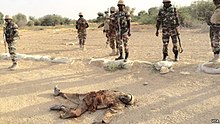Portal:Nigeria/Selected article/5

The Boko Haram insurgency began in July 2009, when the militant Islamist and jihadist rebel group Boko Haram started an armed rebellion against the government of Nigeria. The conflict is taking place within the context of long-standing issues of religious violence between Nigeria's Muslim and Christian communities, and the insurgents' ultimate aim is to establish an Islamic state in the region.
Boko Haram's initial uprising failed, and its leader Mohammed Yusuf was killed by the Nigerian government. He began the group in the year 2002, with a view of opposing western education with his followers. The movement consequently fractured into autonomous groups and started an insurgency, though rebel commander Abubakar Shekau managed to achieve a kind of primacy among the insurgents. Though challenged by internal rivals, such as Abu Usmatul al-Ansari's Salafist conservative faction and the Ansaru faction, Shekau became the insurgency's de facto leader and mostly kept the different Boko Haram factions from fighting each other, instead focusing on overthrowing the Nigerian government. Supported by other jihadist organizations including al-Qaeda and al-Shabaab, Shekau's tactics were marked by extreme brutality and explicit targeting of civilians.
After years of fighting, the insurgents became increasingly aggressive and began to seize large areas in northeastern Nigeria. The violence escalated dramatically in 2014 with 10,849 deaths, while Boko Haram drastically expanded its territories. At the same time, the insurgency spread to neighboring Cameroon, Chad, Mali, and Niger, thus becoming a major regional conflict in Sub-Saharan Africa. Meanwhile, Shekau attempted to improve his international standing among jihadists by tacitly aligning with the Islamic State of Iraq and the Levant in March 2015, with Boko Haram becoming the "Islamic State's West Africa Province" (ISWAP).
